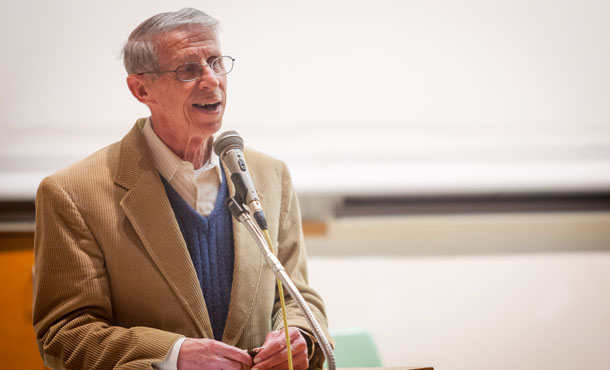The image of an experienced country doctor making house calls with a big black bag full of basic medical equipment has not completely disappeared. Even in a culture of increasing skepticism for physicians and of increasing medical costs, rural health care providers seem to be retaining their respected positions in society.
Linford Gehman ’59, a doctor serving a rural population in northern Rockingham Co. and across the border into West Virginia, still uses his iconic black bag on occasion. After graduating from what was then Eastern Mennonite College, he attended Jefferson Medical College, where he studied with Robert Gallo, one of the discoverers of the retrovirus that causes AIDS. After graduating from Medical College of Virginia in 1963, Gehman entered a residency that was cut short by a request from Mennonite Central Committee (MCC) to practice medicine in Vietnam and then Nigeria before returning to Virginia.
The journey to Vietnam marked the beginning of nearly five years of medical mission work for Gehman. He described his travels and experiences to an audience composed primarily of students and faculty in a seminar titled “Will the Glorious Respect for the Country Doctor (Health Care Provider) Continue into the Future?” this Jan. 12.
Upon arriving in Vietnam in April 1965, Gehman trained under and eventually replaced Carl Yoder, a physician MCC assigned to Vietnam long before the U.S. deployed its first foot soldiers in March 1965. Gehman worked in a hospital in the city of Nha Trang, treating the worst cases of cataracts and entropions, a complication resulting from the inward folding of the lower eyelid.
After more than three years in Vietnam, Gehman was reassigned by MCC in 1969 to Biafra, a secessionist state in southeastern Nigeria. There, he treated outpatients in conjunction with the military of the Igbo people, who failed in their efforts to secede in the three year-long Nigerian civil war. Hunger killed far more people than military weapons, causing Gehman to feel acutely aware of his privilege. “The experience was unpleasant, if not disastrous,” said Gehman of his year-long experience in Biafra. Even so, he “rather liked the adventurous aspect of medical relief work.”
When the Igbo leaders fled the country, indicating the end of the civil war, Gehman also left. He returned to the United States, refreshed his education at the University of Virginia, and began what turned into 45 years of providing healthcare through the Green Valley Clinic on Brocks Gap Rd. in Bergton, Va. (With the closure of this clinic in mid-January, Gehman moves eight miles up the road to the E.A. Hawse Health Center in Mathias, W.Va., where he plans to work at least another two years, until he is 83.)
Gehman found examples throughout his life where old practices differ from modern ones. For example, he graduated about $6,000 dollars in debt, substantially less debt than most medical graduates face today. He also described performing cataract surgery “the old way, via dovetail incision through the sclera.” The “new way” is less invasive and less risky and requires no numbing or stitches. Medical charges to his patients have also increased from the maximum of $10 when he began at Green Valley Clinic.
Some things, however, never change. One might suspect that the sophistication of modern medicine has rendered the black bag carried by “horse-and-buggy doctors of years ago” obsolete, but Gehman still takes it when visiting home-bound patients.
Gehman shared his experience and contrasted his generation from the rising generation of medical doctors as part of EMU’s 2014-15 Suter Science Seminar Series. Students, faculty, alumni, and community members are welcome to the remaining seven seminars for this academic year.

I consider it a privilege to have been treated by this great doctor, many times long after regular business hours! There are very few people and even fewer doctors left that care about others in the way this pillar of a community has for half a century.